#verbs listens to podcasts
Explore tagged Tumblr posts
Text
I've been enjoying the friendpilled meme as much as everyone else but now I can't see fucking anything that's "verb-er" without saying it in my head with more Rs. was browsing movies the other day and my brain just "the punisherrrr" "the killerrr" i fucking hate the internet
#friendpilled visitmaxxer#this is in jest but also goddammit brain#i was listening to a podcast and they said verb-er and it happened again#mine
26 notes
·
View notes
Text

Excuse the shittily made meme but here’s why I won’t be fixing my sleep schedule tonight
#i have a good book i could be reading but my brain was like nah#you can’t read this right now and here. why? you just can’t#so i turned to the dreaded phone#finished section 2 unit 13 of spanish ✨ and now i can’t decide whether to do unit 14 or skip it#i’ve been skipping units that have vocab i already know. hence how i got halfway through unit 2 in three weeks#but i think i could use the verb conjugation practice to be honest#i have a habit tracker in my language journal and i wish it wasn’t there because it just shows i’ve been skipping verb conjugation#for like a week now. so i Should definitely do it#personal#also please don’t tell me how bad duolingo is i already know#i’m not giving them money and i do other stuff#i have a textbook; like 3-4 podcasts i listen to; i’m watching telenovelas and vlogs and interviews in spanish#i do duolingo every day because it helps me stay consistent and review vocab and it’s so accessible#i get reminders in my push notifications and email like twice a day to do a lesson and i have a widget on my phone#and honestly it beats doomscrolling. so
0 notes
Note
how did you get into studying chinese?? also any tips for beginners?
How I Got Into Studying Chinese + A Beginner's Guide!
So, a lot of you have asked me about how I started studying Chinese and tips for beginners. I thought I’d share my story and a little guide for anyone wanting to dive into this (Piàoliang ! 漂亮 - beautiful ) language! +++ I will put a link of a PDF document and free webs that will help uuu at the end !
First things first, why Chinese? For me, it’s because I’ve always been drawn to the culture—everything from the festivals, history, and even Chinese dramas. But most importantly, my dream is to get into a good college in China! 🏫Just thinking about living there, speaking the language fluently, and experiencing everything firsthand keeps me motivated.
Starting Out:
When I first started, I was overwhelmed (it’s Chinese, after all!). But once I broke it into smaller steps, things became manageable and even fun! Here’s what helped me:
Step 1: Master the Basics
Learn Pinyin: Pinyin is the Romanized system for pronouncing Chinese words. It’s like the training wheels for speaking Chinese. Apps like HelloChinese, or Duolingo (for pinyin .. it HELP TRUST ME) !
Practice Tones Daily: Chinese is a tonal language, meaning the tone you use changes the meaning of the word. Start with the four basic tones and practice them with simple words like 妈 (mā - mom), 马 (mǎ - horse), or 吗 (ma - question particle). Don’t stress if it feels awkward at first—it gets easier!
Step 2: Build Vocabulary Slowly
Focus on high-frequency words like numbers, greetings, or common verbs. Think of words you’d use every day.
Try flashcards! Apps like Anki or Quizlet are amazing for memorizing characters and words.
Step 3: Start Learning Characters
Characters might seem scary at first, but they���re not impossible! I recommend starting with basic ones like 人 (rén, person) or 好 (hǎo, good).
Practice writing them—it helps you remember better. Plus, it’s oddly relaxing!
Step 4: Immerse Yourself
Watch Chinese shows or movies (C-dramas are SO good). Even if you don’t understand, you’ll start picking up tones and common phrases.
Listen to Chinese music or podcasts. [My playlist here!] while reading lyrics to learn new words.
Step 5: Practice Speaking
Speak out loud as much as possible, even if you’re just talking to yourself.
My Top Tips for Beginners:
1. Set small goals. Start with something achievable, like learning 5 words a day.
2. Be consistent. Even just 15 minutes a day is better than cramming once a week.
3. Get a notebook. Writing down characters and vocab feels more fun
4. Celebrate your wins. Did you recognize a word while watching a show? Did you finally pronounce something right? That’s progress!
5. Don’t compare yourself to others. Everyone learns at their own pace.
PDF DOCUMENTS + SITE WEB (FOR MANDARIN LEARNING)
document n¹ if the link didn't work write down on Google ( nihao textbook 1 pdf)
document n² if the link didn't work write down on Google ( Chinese text a pdf )
site num ¹
site num²
Why You Should Keep Going:
I know learning Chinese can feel overwhelming, but trust me, every step you take gets you closer to your goal. For me, imagining myself walking around a college campus in China, speaking fluently, and making friends there keeps me inspired. If you have a big dream like mine, hold onto it—it’ll carry you through the tough days!
Remember: 加油 (jiā yóu - "keep going"). You've got this!
@bloomzone ✒️
#bloomivation#bloomdiary#becoming that girl#glow up#wonyoungism#wonyoung#it girl#dream life#divine feminine#creator of my reality#it girl affirmations#love affirmations#study blog#study motivation#studyspo#stay focused#study inspiration#confidence#jang wonyoung#this is what makes us girls#feminine energy#alone but not lonely
67 notes
·
View notes
Text
Free Norwegian Language Resources
I see many learners looking for Duolingo alternatives and realized I haven’t shared any new resources in a bit! So here are my personal favorite Norwegian learning resources that are completely free!
NTNU’s NoW (Norwegian on the Web) — Online independent learning course developed by a Norwegian university that progresses from beginner to intermediate level. Includes reading, audio, practice exercises, and grammar! [A1-B1 level]
Norskappen (App store link) — Fantastic vocab practice with real human spoken audio! There is also preposition practice, article gender practice, and verb practice. The app’s creator actively listens to and incorporates user feedback (link to Reddit post by creator asking for feedback). [A1-B1 level]
Norsklærer Karense on Youtube — Grammar and vocabulary videos produced by a Norwegian language teacher. Lots of in-depth explanations of grammar with examples, differences between similar words, and advice and information about taking the Norskprøven (Norway’s official language test). [A1-B2+ level]
If you are aiming to take the Norskprøven at B2 level, your best resources are often going to be the ones not designated as a “course” — reading articles on NRK or Store norske leksikon, watching Norwegian news/debate shows and podcasts (since B2 level involves being able to reason and defend an opinion) like Debatten or Dagsnytt 18, and lastly, producing your own language in written or spoken format. For that last one it helps to find a tutor who can practice with you and correct your writing, but besides that you can really come a long way for free!
Lykke til! 💫
248 notes
·
View notes
Text
5 Proven facts to learn a new language faster
Hey all, as an experienced language learner, having learnt two foreign languages to fluency in a relatively small amount of time, and having a lot of experience with tons of other languages, I would like to share with you my 5 tips, which are supported by science, to learn a language faster.
Language learning is important for multiple reasons, one of which is that it stimulates your brain in new ways and can prevent mental diseases like Alzheimer's and dementia. Another reason is that it makes you see the world in a different light and gives you access to new countries, cultures and people.
After reading this blog you will be much more secure in your language learning and will have access to a faster way to mastering your preferred language, so make sure you implement all of these in your next study routine.
Now without further ado, let's start.
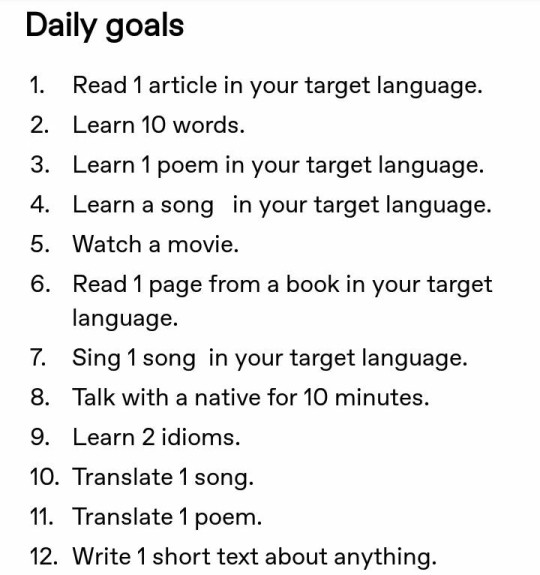
1. Set clear goals
We all like to be ambitious, but it's important to be realistic as well. Learning a language takes time and even if you optimise your study sessions, it'll still take some years to get fluent (although it depends on the language you're learning and which ones you already know). The reason most people give up on language learning is because they set too high goals and don't reach them, so they become demotivated. Instead of telling yourself to learn 20 words a day, which is a lot, reduce it to 100 words a month. 100 words is still significant progress and is definitely doable even if you're busy, since you would only have to learn 3-4 words of day, which would require about 10, 15 minutes max. In a year you would learn 1200 words, and if you have more time, you could even double it to 200 a month.
It is scientifically proven that people that set reachable goals are more likely to stay motivated and get fluent in the language they're learning.
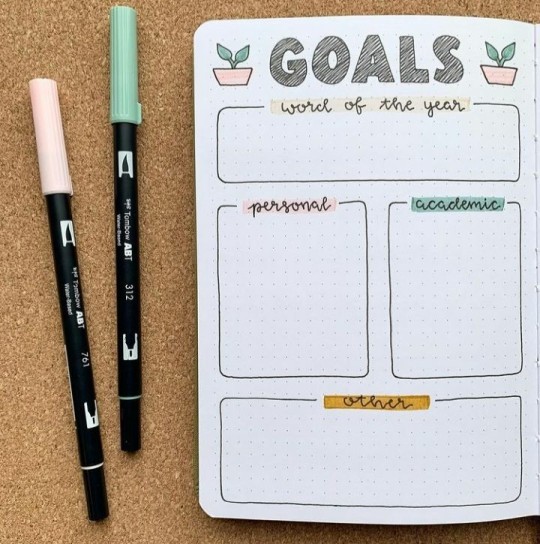
2. Immerse yourself
The second way to learn a language in a faster way is to immerse yourself. I myself have always used this, going to different countries and staying there for some time, and it's always very rewarding since I come back with much more control and fluency in my language.
If you don't have the time and resources to go or move to a new country, which is definitely understandable, you could immerse yourself in different ways, like watching tonnes of YouTube videos, listening to podcasts and talking to natives online. You can use apps like Spotify, Tandem, HelloTalk and Slowly for this.
You could also go on subreddits like r/language exchange to find yourself a language partner.

3. Use language learning apps
Although there's a lot of discourse about whether you should or shouldn't use language learning apps, and whether or not they're a waste of time and teach you enough to not use actual textbooks, it can be said that there definitely are certain language apps that help you get closer to your language learning goals faster. Using apps like Anki or Quizlet to learn vocabulary consistently, and Busuu and Babbel for grammar, can significantly help you reach a higher level in your language. Just make sure you don't use just one app, and that you focus on all aspects of language learning.
A possible combination of apps: Anki for vocabulary, Busuu for grammar and Tandem and YouTube for immersion.
Also, you can still use traditional tools for your language learning and combine them with apps. You could use a textbook for grammar and download an app for practising verbs and another one for cases (or use certain websites). Either way, language learning apps are proven to help you learn a language quicker, since they keep your progress organised and keep you motivated. Sometimes they can have an addictive interface like Duolingo so that they make sure you learn something everyday.
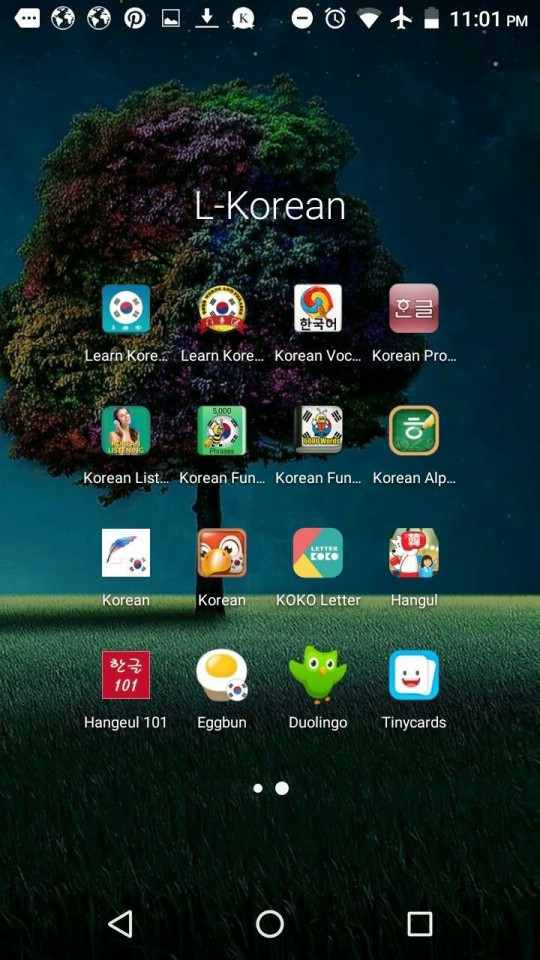
4. Learn everyday
As for my fourth tip, it's crucial you learn something every single day and not skip a day. Skipping a day can quickly turn into three days, and then a week, which can make you demotivated and harder to start again. You don't have to study for an hour everyday, but just 5 minutes will keep you on the right track and keep you motivated.
You can also try to incorporate language learning in your daily life, like putting sticky notes with vocabulary on your desk or fridge. You can set your background of your phone to a list of 20 new words you have to learn for the week. If you're very serious, maybe consider dating someone who speaks the language you wanna learn, since you can immerse yourself this way naturally.
If it's needed, turn on an alarm or reminder on your phone for language learning or make it a habit to study everyday after you wake up, before you go to sleep, during breaks etc.
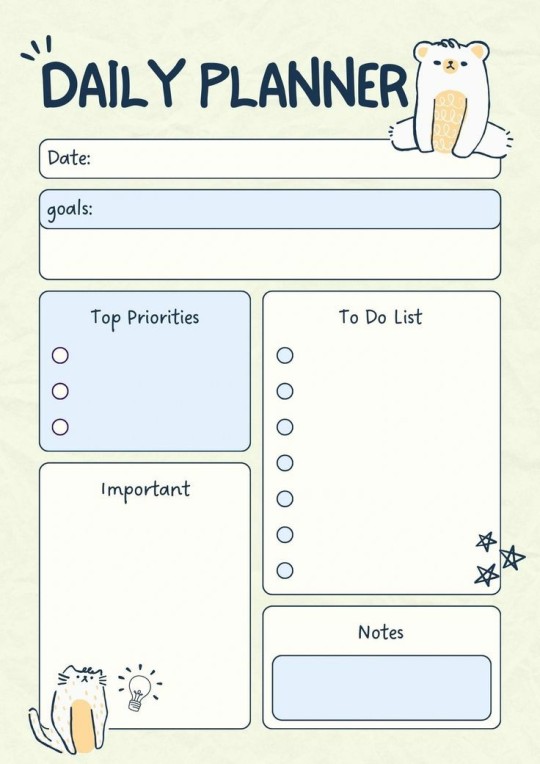
5. Track your progress
This might sound simple, but it's one of the things that makes people demotivated and stop learning their language. When you get to a certain level, you'll feel "stuck"; you'll feel like you're not progressing. By writing down what you've learned everyday after you study, you'll stay motivated to learn again the next day and the next day and the next day. You'll learn your language faster since you'll stay consistent and since there's less of a chance of you becoming frustrated and feeling stuck and maybe even giving up.
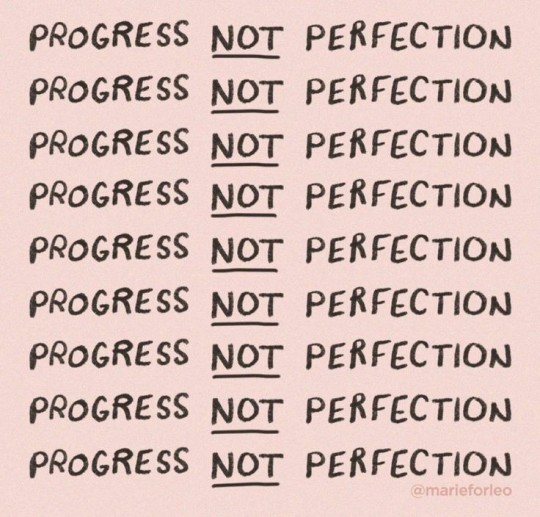
Bottom line
There are multiple ways to learn a language quicker, supported by science, like setting clear goals, immersion, using language learning apps, making sure you study everyday and tracking your progress. With these 5 tips you should be ready to take your language learning to the next level.
Thank you for reading and I hope this blog has helped you come closer to your goals. If you want to read more content about studying, language learning, culture, travel, history and countries, definitely don't hesitate to follow my account since I'll post a lot more.
#linguistics#travel#language#words#europe#culture#language learning#language learner#studyblr#study motivation#study blog#studyspo#study aesthetic#langblr#polyglot#learnlanguages#foreign languages#studying#study inspiration#studyinspo#travelling
36 notes
·
View notes
Text
some people are upset by the use of the phrase "consuming media" instead of "reading/watching/listening to books/shows/music" and I just think a real elegant solution would be to say "eating media" instead. you only need one verb for everything and you sound like the kid who ate a maurice sendak original instead of an op-ed writer.
ex: "I've been eating a lot of podcasts recently."
#realized I have over a hundred drafts so decided to look through them#I think past Nat was onto something here#consider how much better 'content eater' is than 'content consumer' too#my nonsense
84 notes
·
View notes
Text
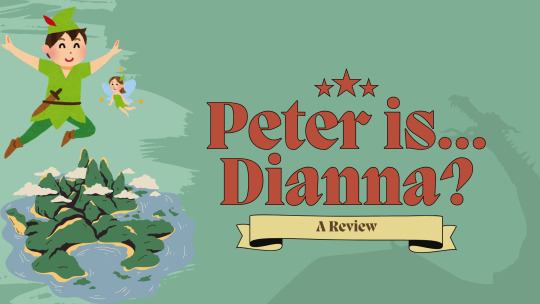
Introduction
By now, we all have our opinions of The Tortured Poets Department: The Anthology. It has received mixed reviews from critics to fans alike.
In the Gaylor community, many have dubbed it her “straightest album,” which I am inclined to agree with. BUT.
If you do not like Gaylor or Swiftgron content, feel free to block and/or keep scrolling!
I’ve seen and read theories for years. In this post I will be referencing the Swiftgron Masterpost. I’m also an avid listener of the What I Will Say podcast. (No one affiliated with the podcast is involved with this post, and for all I know might disagree with it entirely. However, I will be referencing the masterpost at points, and it is only fair to give credit where credit is due.)
This is celebrity gossip, and everything is alleged. I do not know Taylor or Dianna. This is alleged (don't sue me, tysm!)
Peter is…Dianna?
Halfway through my first listen of “Peter,” I was fully convinced this song was about Dianna. That Peter was Dianna.
First, I will go through the lyrics that most pointedly seem Dianna-coded to me.
Forgive me, Peter My lost fearless leader In closets like cedar Preserved from when we were just kids Is it somethin' I did?
Taylor references closets in “seven” on folklore:
And I've been meaning to tell you I think your house is haunted Your dad is always mad and that must be why And I think you should come live with Me and we can be pirates Then you won't have to cry Or hide in the closet
Cedar closets are used as a "safe haven" to put valuable items in. The closet has preserved everything from when Taylor and the muse were "just kids" (likely meaning their early twenties.) Shoutout to Kristin in the WIWS Discord for mentioning this!

Credit
Another interpretation I found on Genius mentioned that the closet line in “Peter” could also be a reference to another fantasy story, The Chronicles of Narnia, wherein stepping into a closet revealed a new fantasy world. This fantasy narrative ties in with “Peter”/Peter Pan and “Wonderland”/Alice in Wonderland, which we’ll get to in a second.
The line “And I think you should come live with/Me and we can be pirates” can also be connected to Peter Pan. Peter Pan and the Lost Boys often have to fight off Captain Hook and his pirates. There are also theories that pirates/Captain Hook are old Lost Boys. TL/DR: Old lost boys are either killed by Peter Pan or can choose to become Lost Boys…at least by these fans’ interpretations. A weak link I know, but still an interesting one.
“We can be pirates” because you’ve been forced to grow up too quickly…? Hm.
Further connecting “seven” to “Peter” is the idea of being just kids, although in “seven” it seems to be more literal, while in “Peter” she might be referring to when she and Dianna actually met: Taylor was ~20 years old, and Dianna was ~24.
From “Peter”:
Are you still a mind reader? A natural scene stealer? I've heard great things, Peter But life was always easier on you Than it was on me
Dianna is stunning, and has often been referred to as a scene stealer.

Credit
“When we cast Dianna as Quinn, she ruined the part for me,” Murphy says. “She was supposed to be the Cybill Shepherd, Last Picture Show cunt, so to speak, but she humanized it. She can cry at the drop of a hat. So now her character has a conscience, a soul and great vulnerability.” Ryan Murphy, Rolling Stone. Credit

Credit (Shoutout to ellie from the WIWS Discord server for bringing the TCA nominations for "Female Scene Stealer" to my attention!)

Credit
More from “Peter”:
And I won't confess that I waited, but I let the lamp burn As the men masqueraded, I hoped you'd return
I viewed this through a queer lens upon first listen; the definition of masqueraded (verb) is “to go about disguised/to assume the appearance of something one is not.”
When Taylor sings “as the men masqueraded, I hope you’d return,” the you is implied to not be a man.
We’ll circle back to lamps burning/lights in Part 2.
And you said you'd come and get me, but you were twenty-five And the shelf life of those fantasies has expired Lost to the "Lost Boys" chapter of your life
Dianna was twenty-five when she and Taylor allegedly began dating.
Dianna, through multiple interviews and her old tumblr blog (that often mentioned children’s fantasies and stories), seems to cherish her inner child and not be in any rush to “grow up.”
From an interview for Galore Magazine in 2014:

Credit
There are also Dianna’s frequent posts on Tumblr about fairytales and children’s stories - this could lend itself to the idea she was living a “Lost Boy’s life.” More on that later.
But the woman who sits by the window Has turned out the light
Again, there is a reference to light, which is a theme (amongst many) we will visit in Part 2 of this analysis.
These lyrics draw natural parallels to Disney’s animated Peter Pan film, wherein Peter Pan visits the Darling children through their window. Wendy is seen sitting by the window, yearning for something more.
In another TTPD track about windows, “I Look in People’s Windows,” there are obvious parallels to “Peter.” These parallels are so strong that I believe these songs are almost certainly about the same person.


Credit | Credit
In “cardigan” from folklore, Taylor seems to categorize herself as Wendy and an unknown muse as Peter.
I knew you Tried to change the ending Peter losing Wendy
More “cardigan” parallels will be drawn in Part 2. Part 1 is focusing on “Peter” itself as well as its tie ins to another TTPD song, “I Look in People’s Windows.”
I Peter Looks in People’s Windows
Connecting “Peter” and “I Look in People’s Windows” is almost too easy, yet I didn’t catch it on my first few listens. Let’s break it down.
The images referenced above show that windows are a central plot point to Peter Pan. Waiting by the window symbolizes yearning for something more, something magical. Wendy is waiting for something more: for Peter’s return. We can draw parallels between Wendy’s window and the rabbit hole in Alice in Wonderland: a portal to something whimsical and dangerous.
If you’re new here, “Wonderland” from 1989 is known to many as one of Taylor’s most blatant songs about a woman: Dianna Agron. I encourage you to read this portion of the Swiftgron masterpost if you’re new or need a refresher!
Sit and Wait, Sit and Wait
The first theme we’ll discuss is longing/yearning. Both in “Peter” and “I Look in People’s Windows,” Taylor conveys a strong sense of yearning for a person with whom a relationship has permanently died, despite her hopes.
From “Peter”:
The goddess of timing Once found us beguiling She said she was trying Peter, was she lying? My ribs get the feelin' she did And I didn't want to come down I thought it was just goodbye for now
/
Said you were gonna grow up Then you were gonna come find me Words from the mouths of babes Promises oceans deep But never to keep
/
Forgive me, Peter, please know that I tried To hold onto the days when you were mine (Hold onto the days) But the woman who sits by the window has turned out the light
The woman (Taylor) who sat by the window has given up hope (turned out the light.)
Also, fun fact about "my ribs get the feeling she did": Dianna Agron removed a Wonderland tattoo after the song "Wonderland" was released. Guess where the tattoo was?
On. Her. RIBS.

Credit
"We're all mad here."
Also, "What will we become? We become ourselves," is a quote from poet Patti Smith. Yes, the same Patti Smith referenced in the title track for The Tortured Poets Department. (Thanks to thea from the WIWS discord for pointing out the Patti Smith connection to me!)

Credit
(Shoutout to reddit user aztraps for pointing out the rib lyric to me!)
The themes of yearning continue on “I Look in People’s Windows” during essentially the entire song, but here are some highlights:
A feather taken by the wind blowing I'm afflicted by the not knowing so
I'd be remiss not to mention that Peter Pan, throughout many adaptations, is known for his feather in his cap.

Credit

Credit
The Paradise of Peter Pan by Edward Mason Eggleston, 1934
You might notice in this painting that Peter looks like...well, a woman (stereotypically and historically!) The character of Peter Pan is normally played by a woman on stage and is often depicted with female features. This makes Dianna being Peter even more...suspicious.
More from “I Look in People’s Windows”:
I look in people's windows In case you're at their table What if your eyes looked up and met mine One more time
This is a love that is ended, yet Taylor can’t help but wonder what might happen if flames rekindled.
I know what you’re thinking – Taylor Swift isn’t walking around random neighborhoods peering into neighbor’s windows. You’d be right (hopefully.) This song is a metaphor, in my view, for “insta-stalking” or social media “stalking” an ex, constantly checking up on them to see what they’re up to, who they’re with. She checks mutual friends’ pages, looking to see if she sees her love (Dianna) “at their table” (with them.)
The real question is - why use windows as the metaphor for internet stalking your ex? Perhaps to tie it into another song about that same ex?
More "ILIPW" lyrics:
I tried searching faces on streets What are the chances you'd be Downtown, downtown, downtown Does it feel alright to not know me? I'm addicted to the "if only"
Taylor is YEARNING for this person. She also seems to be unable to believe this person has been able to seemingly move on without her (just like Peter has.)
In “Peter,” Taylor’s relationship didn’t turn out as she hoped. She hoped this person would come back, and they didn’t. (“Come Back…Be Here” anyone??? PART TWO)
“I Look in People’s Windows” highlights the fact that Taylor has not completely moved on. As she goes about her daily life, she still “peers in people’s windows” (checks instagram/twitter/etc.) for this person. IT’S THE SAME MUSE!!! (Allegedly.)
In addition, the line: “I'm addicted to the "if only"” is especially interesting given Dianna’s interesting response to rumors of dating Taylor in a May 2023 (!!!) Rolling Stone article:

The theme of waiting is also important to discuss. In “Peter,” Taylor is waiting for someone who said they would grow up and find her; she’s sitting by the window waiting for them. In “ILIPW,” Taylor is looking through windows waiting for this person’s eyes to meet “mine one more time.” Both songs have this sense of sit and wait, sit and wait, sit and wait.
Taylor looking into people's windows and obsessing over gatherings where the muse might be in attendance reflects a sense of longing and yearning, reminiscent of Wendy's yearning in Peter Pan to reconnect with Peter despite being unable to bridge the gap between their realities:
Lyrics from “Peter”:
We both did the best we could do underneath the same moon In different galaxies
Eternal Youth
More from “I Look in People’s Windows”:
I look in people's windows Transfixed by rose golden glows
To view something in rose colored glasses is to see something in “favorably disposed opinions : optimistic eyes.”
One could compare this to the rose colored glasses Wendy takes on when visiting Neverland, or when Alice visits Wonderland. (Again, we will be reviewing Wonderland’s connection amongst many other songs in connection to “Peter”/“ILIPW” in Part 2.) Both of these fairytales cater to the inner child and youth.
The theme of eternal youth in “Peter”, based on the fairytale of Peter Pan, is self explanatory, and I don’t feel the need to go into detail in this already MASSIVE post.
For this example, we’re going with the theory that “Peter” and “ILIPW” are inspired by the same muse/relationship. “ ILIPW’s” theme of yearning can be interpreted through the lens of Wendy's relationship with Peter—a story that encapsulates the longing for eternal youth (which Taylor writes about in “22” on Red, a song that is DEDICATED TO DIANNA, the pain of growing up, and the poignant realization that some connections are meant to remain in the realm of dreams and memories.
Rediscover Your Sense of Wonder
Peter appears unexpectedly and at random to seemingly bring a sense of magic and wonder to those around him, including Wendy and her siblings. Peter visiting the Darling children through their window symbolizes the allure of escapism, especially for someone like Taylor who cannot lead a normal life, and the desire to remain forever young.
“ILIPW,” if you allow the interpretation that it is intrinsically connected to “Peter,” indicates a longing to recapture, if anything, the innocence and adventure embodied by Peter/the muse. Taylor’s fixation on windows is a search for moments of enchantment and wonder that the Peter muse gave her.
If we follow this line of thinking and allow Dianna to be the muse of “Peter” and “I Look in People’s Windows,” it’s very interesting that the song canonically dedicated to Dianna centers around the very idea of youth and wonder: “22” from Red, as seen in the Rolling Stone piece mentioned above.
From “22”:
We're happy, free, confused, and lonely at the same time It's miserable and magical / It seems like one of those nights We ditch the whole scene and end up dreaming Instead of sleeping / Everything will be alright If we just keep dancing like we're 22
Tumblr / felldowntherabbithole
Dianna once had a tumblr with the url felldowntherabbithole. While I searched what archives I could find, it was quite overwhelming, and I didn’t get through many of her posts throughout the years she was active. However, I will mention posts I did find that showcased her interest in fairytales, and why Taylor might choose one (or two…“Wonderland,” anyone?) as inspiration for songs she has written about Dianna.
FIRST: This old post was found by Cam from whatiwillsay. She is not affiliated with this post and did not endorse it. However, I was unable to find this screenshot myself on the Wayback Machine, so I want to give her credit for finding this post on Dianna’s blog:
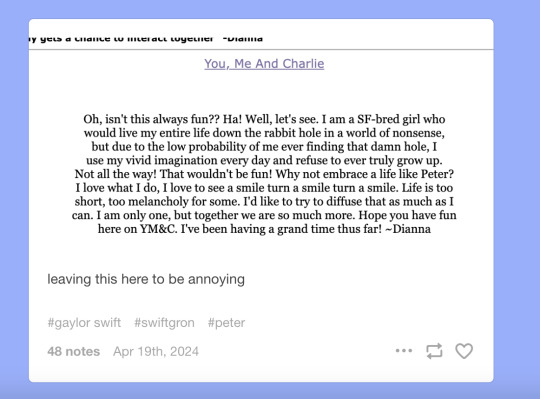
Credit
Now, onto some screenshots I found myself of Dianna’s love of fairytales, all courtesy of the Wayback Machine:
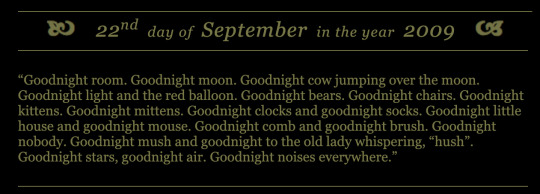
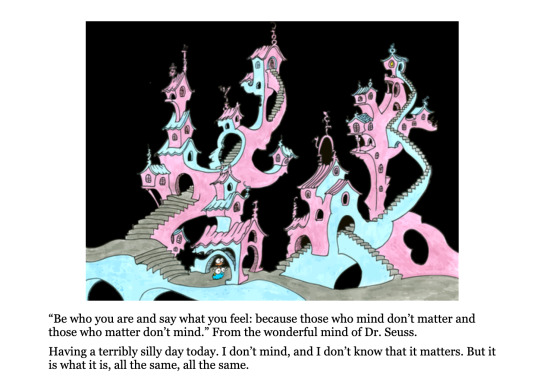
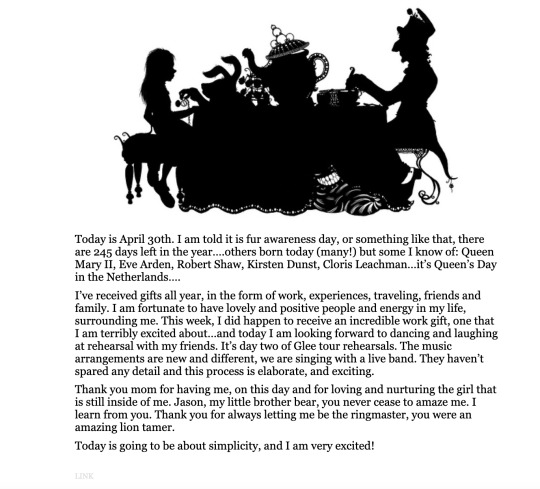
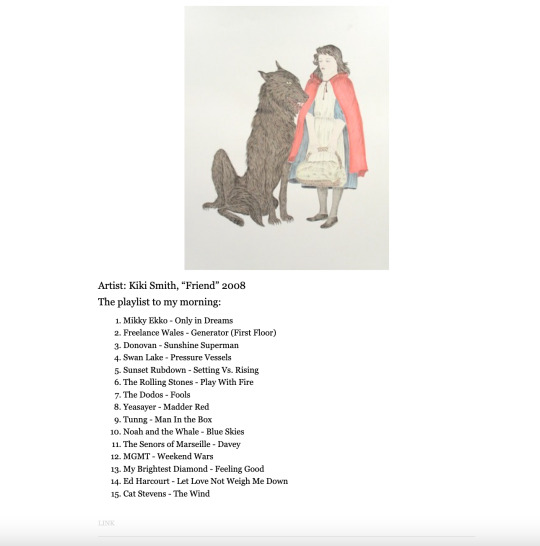
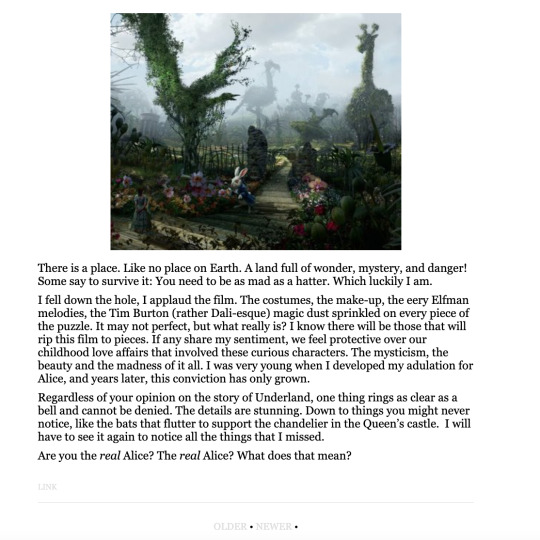
References from bottom to top: Goodnight Moon, Dr. Suess, Alice in Wonderland, Little Red Riding Hood, Underland (a retelling of Alice in Wonderland)
Part Two
PART TWO is here!
If you have any comments, suggestions, or questions, I’m more than ready to hear your thoughts!
Part Two will cover "Peter" and "ILIPW's" connections to other songs associated with Dianna.
Part 3 will cover anything I missed that I didn't feel I could edit into Part 1 or 2, as well as some more reach-y theories that I still feel deserve an honorable mention!
This post will be edited for grammatical and factual errors as necessary, as well as adding more evidence I feel needs to be included in this post.
#gaylor#swiftgron#gaylor swift#peter#i look in people's windows#gaylor theory#gaylor lyric analysis#swiftgron lyric analysis
45 notes
·
View notes
Text
Language Guinea Pig Diaries #2: Highlights & Troubleshooting
I'm trying to improve my skills at four languages in preparation for summer travel: Italian, Dutch, Finnish, and Estonian.
Italian and Dutch I've studied a bit a while ago and I'm now trying to "activate" so I can hopefully have a conversation or two in them, while Finnish and Estonian I'm trying to pick up some rudimentary bits in. Here's the previous post in this series describing these goals and strategies in more detail.
Highlights
I've progressed from my menu of only gelato-making videos in Italian to other recipes in general, and in particular to lots of cooking videos from this popular Italian home cooking channel which was in the recommended videos after another one I watched. Maybe I'll branch out again at some point to other speakers, but for now it's nice to be able to stumble into more videos without having to think up new keywords to search. Also, I might need to make some of these recipes now...
The Dutch podcast listening is going well (though see weird issue below) and I especially like that the podcast I chose because it's the only podcast I knew in Dutch contains a mix of adult-to-adult and adult-and-child speech, which is a fun way to mix it up.
In Estonian, so far I have learned one (1) highly useful word, "tere", which this video tells me is an all-purpose neutral greeting (neutral with respect to both formality and time of day). Ooh, I've just realized while writing this post that it's probably cognate to Finnish "terve", a greeting I learned from Duolingo! (Yes, I just looked this up, seems like they both mean something to do with health.) So I've already learned one neat thing!
I'm also recognizing a few Estonian cognates from the Finnish Duolingo lessons, especially the verb "on" (which means "is"). I'm not recognizing many other words though, and I'm wondering how much of that is differing vocab and how much of that is not having learned many common words in Finnish yet (I've been especially chafing at how few verbs we've learned yet, it would be really useful to have a word like "I want" even if it's unanalyzed because the grammar is more complicated than they want to introduce early).
Youtube's algorithm has, after about a week, adjusted to the fact that I now want to watch videos entirely in Italian, and started recommending further Italian videos on my home feed (it was already doing so at the end of previous Italian videos). Tiktok's algorithm, so far, has not done this yet, and is still recommending me stuff in English, despite me aggressively liking basically all of the Estonian videos I watch and nothing else.
Troubleshooting
I've noticed that it's been easier to remember to do the podcast listening in Dutch and the youtube videos in Italian because I already have habits related to opening those apps, whereas I don't have habits around using tiktok so I kept forgetting to open it and look at some Estonian videos. But a couple days ago I moved the tiktok app on my phone to a more visible location, and now it's getting easier to remember.
Something else very weird that I noticed about listening is that when I play the tracks on my phone fairly loudly, it's relatively easy to focus on trying to listen to them, sometimes while playing a simple visual game on my phone for something to fiddle with (I've already noticed that unfamiliar languages need to be played louder than familiar ones). But when I beam the podcast over to my speaker at a distance, suddenly I very quickly start tuning out the unfamiliar language and opening up apps that involve reading and completely ignoring it. I have no problems listening to podcasts on speakers in English; in fact, it's my preferred method when I'm at home, but for some reason this causes my brain to reclassify Dutch as background noise to be ignored, even if it's the same loudness as it would be when it's played right near me. Super weird, has anyone else ever noticed anything like this?
Previously in Language Guinea Pig Diaries:
Summer 2024 travel plans and Language Guinea Pig Diaries
33 notes
·
View notes
Text
Useful links to Learn Finnish
~ Learning resources ~
# Apps #
Duolingo, a classic, it teaches you vocabulary and basic sentence structure
Drops, a great app to learn vocabulary, and it’s organized by subjects
Clozemaster, makes you fill sentences, slightly advanced
Memrise, good to learn vocabulary, includes textbooks vocabulary too
Mondly, teaches vocabulary and basic sentence structure
WordDive, seems like a comprehensive course (I haven’t tested this one)
# Textbooks #
Suomen Mestari, the book most Finnish classes use, is in Finnish only
Oma Suomi, a book for self-learning English speakers
# Websites #
The Finnish Teacher, easily approachable grammar lessons
Verbix, to find verb conjugations
Sanakirja, very complete dictionary and translator
Urbaani sanakirja, Finnish equivalent to Urban dictionnary
Uusi kielemme, a good vocabulary list divided by themes and levels
Finnish swear words on Wikipedia, essential!
# Video & audio lessons #
Finnish Pod, numerous audio and video lessons
Supisuomea-videot by Yle, videos with simple Finnish and subtitles
FSI courses, recordings of conversational Finnish
# Complete beginner resources #
A Taste of Finnish, reading, listening and grammar points
Kielet by Yle, lessons in Finnish with videos
Venla, for vocabulary, structures and grammar
Digital Dialects, games to learn Finnish
~ Listening resources ~
# Podcasts #
Opi Suomea!, a podcast in simple Finnish
Yle uutiset selkosuomeksi, a news podcast in easy Finnish
Auta Antti!, a podcast where the host answers listeners questions
# Music & Radio #
Radio Suomi Pop, only Finnish songs & Finnish speakers
Tunein, to access more Finnish radios
#vainsuomihitit, Spotify playlist with all the new Finnish hits
Suomen musiikki, my Finnish spotify playlist
Mirka Karoliina, Disney songs with Finnish subtitles and translations
# Movies & TV shows #
My Finnish movies masterlist (needs to be updated)
Yle Arena, legal streaming of Finnish shows & others with Finnish subtitles
Some American streaming services (Netflix, Disney+ etc) have things dubbed in Finnish (mostly cartoons and kid’s shows), but most of those are only available if you’re in Finland (or use a VPN)
# Youtubers #
Papananaama
KAKSI ÄITIÄ
maiju
~ Reading & Writing resources ~
# Reading #
Yle uutiset selkosuomeksi, news articles in easy Finnish
Oppiminen by Yle, various articles in easy Finnish
Free Finnish books, for advanced level
# Writing #
LangCorrect, write diary entries and get corrected by native Finnish speakers
~ Communities ~
# Finnblrs #
Tags on Tumblr: Finnish / Finnish langblr / Finnblr / Finnish language
This is Finnish
Suomen Kieli
Fennophile
Tealingual
Finn in training (mine)
# Others #
LearnFinnish on Reddit
Static page version of this post can be found here. Older versions of this article can be found here and here.
361 notes
·
View notes
Note
do u have any tips for language learning? what approaches have worked best for u?
the way i learned english was to first learn the basic words, like numbers, the days of the week, the colours, common verbs (to be my beloathed). then studied how the language was built, like sentence structure and stuff like that, still keeping to the basics. once you have a simple understanding on how the language works (like you start to recognize some words, basically when it stops sounding like gibberish to you) choose a series or movie, preferably for kids bc they have easier words. and you watch it in your desired language with subtitles for your language. so for me, i watched cartoons like avatar the last airbender or she-ra, in english with spanish subtitles. once i started recognizing more english words, i switched to english subtitles. all while still learning english grammar in school (its important to never stop studying grammar while you do this). and i did that for years. every once in a while, i turned off the subtitles and checked my listening comprehension. eventually, i graduated from kids series to more adult stuff that used more complex words. and im still at it today! i still watch english stuff with subtitles (accents are a bit hard for me), but have started listening to podcasts and i found it isnt that hard! im still learning, of course; i have to use a translator for like half of my posts, mainly to check my grammar or remember the meaning of a word. but yeah!
so to summarize (i yapped a bit there sorry): basic vocabulary -> basic grammar -> kids media with subtitles -> kids media without subtitles -> repeat with adult media -> practice grammar regularly -> profit???
of course im not an expert in language learning, and everyones method is different, but thats how me and my sibling learned english
12 notes
·
View notes
Text
Valancing and specificity
I'm gonna geek out about The Story Grid here again, because I have ADHD and specific and granular instructions make my brain go, and The Story Grid is especially good at that and avoiding all the woo-woo "you just have to feel it" bullshit. Okay? Okay.
All right. The latest Story Grid focus has been on descriptions. The book itself is more about plotting and editing, one of the classes they offer now is focused on scene writing, but lately language and description has been on their radar in their emails and Youtube. I dig.
So thing number one has been what they call "valanced language." This is simple. Squeeze descriptors into your nouns and verbs. If the right verb doesn't exist, use an adverb. Don't be scared, they have their place.
For example: "The woman ran down the hall."
Let's start with the first noun. Who was the woman? A secretary? A superhero? A dog groomer? See how each of those examples fills your brain with a distinct idea about why she might be running down a hall? You just fill in all sort of blanks on your own; how she's dressed, what it sounds like as she runs, what she might have in her hands, her expression.
Nice, how about "ran?" How is this woman running, exactly? Is she in a hurry? Is she worried? Is she angry? Does she scurry, or clatter, or jog, or race? If it's a secretary clattering down the hall, that's quite different from a superhero jogging down a hall, or a dog groomer racing down a hall. There are all sorts of implications that come with each, and your brain just fills them all in when the different words are used.
Okay, last, the hall. What kind of hall is it? Is it in a school, a business, a convent, a government building? A secretary clattering down a high school hall has a very different vibe than a hall of the White House. The same with a superhero, or a dog groomer. (Is it just me, or does "The dog groomer raced down the White House hall" scream rom-com? No?)
None of this is to say you have to say "the superhero" every time you refer to your superhero character; if it's established that she's a superhero, you can call her "the woman" or "Agnes." This exercise is to point out what Mark Twain has said: "The difference between the right word and the almost-right word is the difference between the lightning and the lightning bug." It's so much easier to see it with this concrete example.
Now, number two, besides valanced language, the latest Story Grid emails and Youtube vids have been talking a lot about description. About how too much will kill your story, and not like, "You killed it!" but like, "It's dead." They point out that every time you pause the action to describe something, you take a chance that the reader won't put the book down. Readers read for action. They want to know what happens next, not what that tree looks like.
The solution? A few things. Use valanced language; fold your descriptions into the action, don't pause to describe something, note it while you're having the character doing something; and last and most deliciously, use specificity instead of vagueness.
I say "most deliciously" because to me, it is delicious. I love Malcolm Gladwell's podcast Revisionist History, it's such a good braingasm. On one episode I listened to last year, he talked about how country music differs from rock in its ability to pull at people's heartstrings. The main point he gave was specificity -- the lyricist uses very particular imagery to put the listener in the shoes of the singer. I remember thinking that was really interesting, even though I don't like country music myself.
Then Tim Grahl brought up specificity in storytelling. He used this example: "I wanted to show an apartment in disarray, so I was picturing dirty dishes piled in the sink. But rather than just say there were dirty dishes piled in the sink, I have my character wanting to make coffee and finding the French press still caked with yesterday's grounds." That's just beautiful to my mind. It calls up everything you need to see about a place that hasn't been tidied in a while, it gets brought up while the character is doing something, and it has a vibe attached to it. Perfect.
So when you are writing a description, dial down into something particular about the thing you're describing. Traffic sounds? What about a car alarm going off that no one's paying attention to? A crowded cat room at a rescue? What about a calico kitten careening off the other cats after a stuffed mouse? Or cats tucking their paws in to avoid the careening kitten with a stuffed mouse? A boring day at work? How about if the co-worker is flicking paper clips into an empty cup at his desk?
I love stealing from my own life for this kind of thing. It lends some authenticity, I feel. Notice things around you in your life, then when you're writing, think of how to invoke the mood by pulling up one small, particular detail. Then weave that into the narrative, don't stop the action to deliver the picture. Keep the character moving and on-screen, have the description baked into the action somehow. And if it just won't bake in, cut it. Trust your reader to see your world through your character moving through it. Always trust your reader! If they're too dense to get it, you probably don't want them reading your book in the first place.
Anyhow, I am re-editing my first novel (because I want to, and I'm indie so I can), as well as editing my latest novel, and I just cut a couple paragraphs of description from each. In both cases, I dug down and got one particular detail about the descriptions, wove them into the action, and cut the rest. I can definitely see that that scenes are stronger for it, and the visualization of the setting is actually better with fewer but more specific words.
I fucking love what I do.
#writing#writeblr#writer#writing life#writers on tumblr#writingcraft#writer things#writers#on writing#nuts and bolts#writing nuts and bolts#the story grid
9 notes
·
View notes
Text
Speak DECENT CHINESE in 4 months - 8 easy tips
______
1. Have someone to guide you to get good pronunciation habits. It is almost impossible to re-learn bad habits later so make sure you get your pronunciation right from the beginning. I mean the pronunciation of the sounds, not the tones. Tones take more time to get used to and you can't rush it - but try the best you can. Some tutors don't bother too much about the pronunciation so make sure you find someone who is strict about that, you will be grateful later. Also get confident in pinyin, you will need it.
2. Understand the composition of the sentences. The word order is super easy and it stays the same all the time (the question and informative sentences have the same word order). I have a formula for the word order but I won't reveal it here, it is one of the secrets I keep for my students and people who use my materials.
3. Understand that there are no tenses in the sense we think about them in English and other languages. Learn to express future, potential future, finished action, change of state, experience in the past and circumstances of the event. See the difference between action verbs and verbs of state.
4. Learn to use modal verbs and conjuctions.
5. Build usable vocabulary based on the fact that everything in Chinese is interconnected.
6. Understand 就, 才,的 and 得
7. Don't learn grammar rules and words separately. Learn functional practical sentences that will serve you as examples of the grammar structures (then you just need to change the words in these sentences).
8. Develop your listening skills - that is very important. For that there are Youtube channels and podcasts on Spotify (and in my materials the audio part also plays an important role). You can listen to Chinese radio stations just to get the feeling of the language.
______
After 3-4 months you should feel pretty confident in normal conversations if you study regularly under competent guidance.
______
R-evolutionary learning materials and resources: https://chineseffect.com
MAGIC PLAYBOOK for beginners
#learn chinese#learn mandarin#chinese langblr#mandarin langblr#edublr#mandarin#chinese#mandarin edublr#langblr#chinese vocabulary#mandarin chinese#chinese edublr#learning mandarin#learning chinese#study chinese#mandarin vocabulary#study mandarin#汉语#chinese studyblr#beginners chinese#chinese for beginners#learning tips#chinese tips#mandarin tips
321 notes
·
View notes
Text
Nova’s Notes - Dracula Daily - May 25 + 26
The Suitor Squad speaks!!! Ahhh love them <3
Checking in with my favorite wet cat man, Seward is….not doing too well. Let’s listen to his podcast, shall we?
“Ebb tide in appetite to-day. Cannot eat, cannot rest, so diary instead. Since my rebuff of yesterday I have a sort of empty feeling; nothing in the world seems of sufficient importance to be worth the doing…”
Awwww John :(((( to quote Zuko, “That’s rough, buddy.”
Notice how he speaks here. Of course, beside the obvious abruptness and the fall in his appetite today, he also uses the word “rebuff” to describe Lucy’s rejection. Not to Merriam-Webster you, but I wanted to give a quick definition of rebuff because it actually surprised me when I read it:
“an abrupt or ungracious refusal or rejection of an offer, request, or friendly gesture.”
As expected, John is taking this pretty hard because to call Lucy’s rejection of him “abrupt” or “ungracious” is just…untrue? To be fair, we only had Lucy’s side of the story, but that just doesn’t sound like Lucy. I mean, she literally *cried* at the thought of causing him pain!! I’m not trying to police his words here — obviously, it’s his mental breakdown diary and he gets to choose the language — but it does show that he’s not taking this half so well as Quincey (probably) is, and Lucy totally read the vibes right when she worried about him walking away from this broken-hearted. Bro is in the trenches here.
Soooooo he turns to his work at the asylum for help. He really needs to get some better coping mechanisms, but at least we get to meet Renfield!
“In my manner of doing it there was, I now see, something of cruelty. I seemed to wish to keep him to the point of his madness—a thing which I avoid with the patients as I would the mouth of hell. [paragraph break] (Mem., under what circumstances would I not avoid the pit of hell?) Omnia Romæ venalia sunt. Hell has its price! verb. sap”
One thing I love about Dracula is that all of these characters have their own little quirks when talking. Stoker does a fairly good job of giving each character a unique “voice”, which I appreciate. Jonathan writes in a fairly meticulous way with long paragraphs of describing landscapes (plus, “lizard fashion”, of course). Mina writes in much the same way, but different. She seems to break into a more playful style of writing, as you can see with her “???” and “two-pages-to-the-week-with-Sunday-squeezed-in-a-corner-diaries”. Lucy, of course, probably has the most unique voice so far because her letters seem to be written impulsively. In one sentence, she laments how miserable Seward and Quincey are and in the next she celebrates how perfectly happy she is. It’s an active and emotional stream of consciousness we get to see unfold in her letters and — I’ll bet — in the way she talks.
Seward is a new voice and he already is showing a few quirks here. It’s interesting to see how this voice changes since we know he’s actually *speaking* these words, not just writing them down. Unethical behavior with Renfield aside (stop baiting the patients Seward!!!!), notice how he makes a mem. for a rhetorical question.
I find this fascinating because Jonathan does this mem., or memorandum, when he wants to remember something — such as recipes for Mina. But Seward does it when he wants to self-depreciate his own phrasing. Unless, he’s seriously asking the question to remember for later, which he might honestly be due to his next sentences (and in that case, oooooh buddy you’re going to be regretting asking that in a few months). He hits us with a Latin phrase which translates to (from what I could find), “All Rome is for sale” and then ANOTHER ONE which means “a word to the wise” or “enough said”.
What can we garner from this? Other than liking Latin, John likes self-deprecation and also philosophical thoughts about hell, or at least the metaphor of it — and that’s what he wants to save for later. Very interesting!!!
Describing Renfield (who’s 59, huh), I like how he touches on selfish vs. unselfish influences and how that affects humans. I find it interesting that, contrary to popular belief, being unselfish is what Seward would consider to be more dangerous — though it makes sense from his logic.
A selfish person would keep themselves close and be cautious about putting themselves in too much danger. After all, your life is not worth much if you put it at risk and that’s even more true in an asylum. Using “armor” and a “centripetal force” with self as the “fixed point” as metaphors for this kind of behavior is fascinating.
Meanwhile, someone “unselfish” or to put it a different way, acting under the influence of someone else for some unnamed reason (duty, love, etc.) will likely stop at nothing to achieve that goal once they’re put on it. It’s also dangerous to another person because they might not know what that goal is — and might end up being collateral damage as a result. Seward is keen to find out what Renfield’s reasoning is because he doesn’t want to be that collateral damage (and because he’s a curious, semi-unethical doctor buutttt). I like how he adds that only a series of accidents can balance this kind of centripetal force. Thanks for the metaphorical science lessons, Seward!
On to Quincey, my beloved. <333 His letter is to Arthur!
“We've told yarns by the camp-fire in the prairies; and dressed one another's wounds after trying a landing at the Marquesas; and drunk healths on the shore of Titicaca.”
So from the opening lines, we can gather that Quincey and Arthur (and yes, Seward too) have been globetrotting together! Because Titicaca is in South America and the Marquesas happens to be a collective of islands in the Southern Pacific Ocean. Quincey later refers to Seward as their “old pal at the Korea” which *could* mean Korea the country, or as this forum comment section speculates, could also mean the Korea Strait.
It’s super sweet that while Quincey and John want to drown their sorrows in wine, Quincey doesn’t hesitate to invite Arthur to celebrate his engagement to the love of his life as well as theirs oof!
It does seem like Quincey didn’t know before that Arthur was the one Lucy was in love with, because he seemed to speak vaguely to Lucy that he “must be a good fellow if you loved him” and “he’ll have to deal with me if he doesn’t know his happiness”. But, to me, it seems a little too much like what you would say to your friend if you didn’t know the other person. I’m getting a generic “he’ll date you if he knows what’s good for him” vibe.
My guess? Arthur probably wrote to Quincey saying “I’m engaged!!! To Lucy!!!” because they do all know each other and are friends, but maybe Arthur hadn’t wanted to share his feelings with the boy group just yet (he seems like a private person, since Lucy couldn’t get a read on his feelings) or wanted to keep it a surprise until he knew for sure his feelings were reciprocated. Of course, once Quincey received this letter, he put together that “ohhhh Art was my rival the whole time” and probably slapped his knee about the whole thing. It doesn’t stop him from inviting him to the next gathering, though!
The other theory I have is that all three of them knew they loved Lucy and each amicably agreed to still be friends, no matter who she chose (if she chose any of them). It would definitely make sense since Quincey talks about him and Seward “mingling their weeps” as if Arthur would know what he means by that. Additionally, it would make sense, since they all know each other pretty well and likely would know if they all were in love with the same woman, right? That could be why Seward and Quincey were so quick to ask if there was someone else — I mean, yes, that’s always the obvious ask when your proposal fails — but this could add another layer of meaning to their asking.
As for Quincey’s generic approach, that could be explained by him not knowing whether it was Seward or Arthur that Lucy loved (or, perhaps, an unknown third person) and he didn’t want to ask Lucy who it was in that moment, figuring he would find out later if it was indeed one of his friends.
No matter the theory, this letter says a lot about Quincey’s character! He’s obviously a good and honest man for not hesitating to invite his friend to the gathering, even when that friend is engaged to the woman he’s in love with as well. There’s not a lot more to be said about this that hasn’t already been said — but yeah, Quincey is definitely in my top 3 favorite Dracula characters and this is part of why.
Finally, Art’s letter to Quincey!
“Count me in every time. I bear messages which will make both your ears tingle.”
As this is a telegram, he has to make this short and sweet. But make your ears tingle??? Art???? Lol, I’m presuming this is about the proposal or about some other hot gossip (if it’s explained later, I genuinely forgot — again, it’s been two years since I’ve read the book and I keep feeling more and more like a first time reader).
Either way, I hope this is the year we stop calling Arthur boring (if we haven’t already), because he already doesn’t sound boring from just this message and it’s in telegram format.
He sounds like a guy you’d like to party with. “Count me in every time”, “make your ears tingle”? Sounds like a party guy to me! And obviously, he had to be fun-loving and resourceful enough to Quincey if they’ve traveled the world together (and, maybe have seen combat? — not quite clear on that one).
I’ll definitely be keeping a close eye on Arthur this read around. Since I was among the people that called him boring in 2022, I want to see if there’s more to him than meets the eye!
#dracula daily#dracula#dracula spoilers#dracula daily spoilers#(implied anyway)#john seward#jack seward#dr seward#arthur holmwood#quincey p morris#quincey morris#suitor squad#novas notes
20 notes
·
View notes
Text
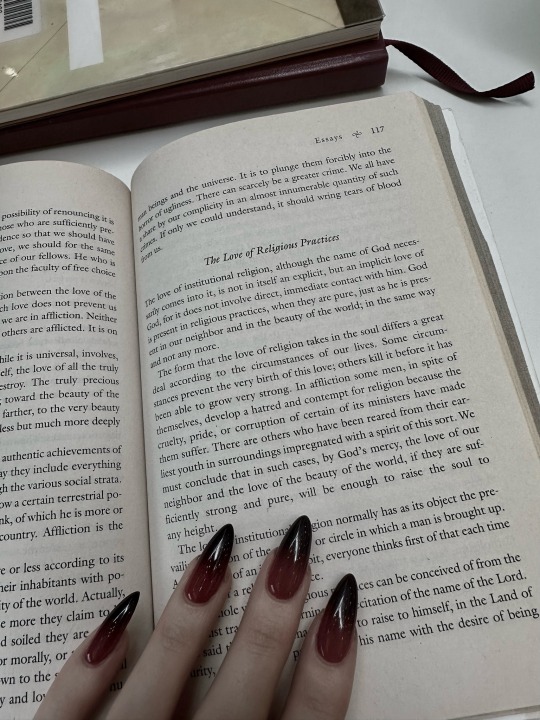
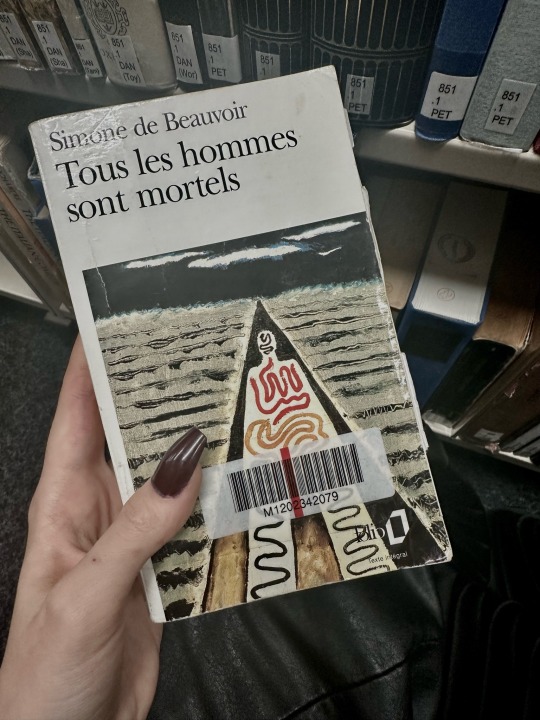
2/100 days of productivity
Nothing out of normalcy occurred, revised some Russian verbs, did some Italian translations and listened to my daily French and Spanish podcasts. Did some readings for my Astro lectures and revised my Calculus and Waves lecture notes alongside some exercises.
I’ve also finally joined my university’s language research centre, which means that besides my Italian seminars I’ll be able to be involved in many other language classes and cultural exchange programs!
I’m currently reading some of Simone Weil’s works and they are constantly spiralling me into religious crisis in the middle of random coffee shops… truly an entertaining experience.
#aesthetic#books#classic academia#dark academia#study#studyblr#literature#studyspo#academia aesthetic#books and reading#classic lit aesthetic#classic literature#classics#philosophy#simone de beauvoir#simone weil#livros#langblr#langblog#language#stem academia#chaotic academia#light academia#romantic academia#books & libraries#bookblr#literatura#stem#stemblr#uni
50 notes
·
View notes
Note
hi girly!! i need your help. i’ve been learning spanish for about a year now, but i feel like i’m not retaining anything. i can say most basic sentences and somewhat hold a conversation, but i struggle with words and the endings like the present tense, past tense, and stuff like that. I was wondering if you have any methods or apps that can help me retain and understand the language a little more?

Helloooo! That’s awesome that you’ve been learning Spanish for a year! It’s totally normal to feel a bit stuck sometimes, especially with verb tenses and endings. Here are some tips that might help:
First, I recommend using simple apps for spaced repetition, like Anki. They’re easy to use and really help with retention. For verb tenses, create charts for verbs (like hablar: hablo, hablas) and practice filling them in regularly. Writing simple sentences or reading aloud can also boost your confidence.
I truly believe that the easiest and fastest way to learn is through immersion. Listen to podcasts, watch shows with Spanish subtitles, and read children’s books or news apps like El País. The more you surround yourself with the language, the better.
HelloTalk is great for chatting with native speakers, so don’t be shy about that and try talking to people more often. Also, create an account on Twitter/X and follow Spanish accounts. Engaging with others by replying to tweets can really help you practice.
To really incorporate Spanish into your life, include it in your hobbies. Change your phone and social media language settings, and try to play games or watch movies in Spanish. This way, you’ll constantly be exposed to the language in different contexts.
Try talking to yourself. You can do this in the mirror or create scenarios in your head. I love Spanish dramas, so I often pretend I’m inside a novel and start talking to myself. It’s actually a lot of fun and helps you see exactly what you don’t know, allowing you to practice the specific words and sentences you need to improve.
Honestly, what might feel the silliest, like talking to yourself, keeping a diary, creating a chatting account, or even reading or watching kids’ books, can actually help you the most. If you’re struggling with the basics, you need to start with the simple stuff. Maybe your mind is too full, making it hard to keep going, so simplifying your approach can really help.
You might also try keeping a diary in Spanish or making collages and journals. Decorate your Spanish notebook (get a real one if you don’t have it; writing helps with absorption). This creative process can make learning feel more personal and engaging.
For more structured learning, try Lingvist or Clozemaster for grammar and vocab. Conjugato is great for practicing verb conjugations, and Busuu lets you interact with native speakers. SpanishDict is also super helpful for checking conjugations and grammar rules.
Start with the present tense, then move on to past tenses like preterite (for completed actions) and imperfect (for ongoing actions). When you feel comfortable, dive into the subjunctive, which is used for wishes and doubts.

I don’t know how you’re learning or the best way for you to do it since everyone is different. But if you haven’t tried immersion yet, I highly recommend it. I also got stuck with Spanish, but after I started immersing myself, I felt like things got better.

Good luck ( ˘ ³˘) ₊˚⊹ᡣ𐭩 I’m glad that my blog has made you comfortable enough to send me a message. If you want something more specific, don’t hesitate to ask me; I might be able to help! I’m not fluent, but as someone who has faced many difficulties, I’ve had to research learning methods that might be useful. ¡Que tengas un gran día, chiquita!

#spnotesbyvi#langblr#studyblr#study blog#study motivation#study notes#langblog#language#study inspiration#study time#studyspo#q&a#answered asks#study advice#learn spanish#spanish studyblr#español
15 notes
·
View notes
Note
I just realised what a lot of radfems have been talking about when they said listening to truecrime podcasts as a hobby (often and as entertainment) desensitised women to violence. I never listened to them (but I did watch one tv program on a federal channel occasionally, but pretty rarely, about the cases back from ussr) and didn't interact with women who do, but I just saw a meme. Barbie with an ipod or a smartphone, with earphones, and the caption was like "after a hard day, I lied down (feminine verb form in the past btw) to listen to truecrime". In vkontakte, the app mostly for russian-speaking people, in a usual public group for memes. I didn't know this spread here like everywhere else in the anglo-dominated internet. I think it has a lot to do with globalisation (americanisation mostly though), be it good, be it bad, the people take the culture. However, when it's not just some chronically online people, but a way larger amount of them, more general public (we do have a problem of too much online time, me included, but that's not the point, as a lot of stuff can be still irrelevant for us and not the other people so sometimes the rus internet seems pretty self-contained) is into this stuff, I think it's so alarming. Do you know if there are is this problem in Balkan youth as well?
I've read this 3 times to try and understand what you're saying but I am still not sure T_T can you put it in simpler terms please. All I get is 'is there a true crime problem with a barbie meme in balkans' and I don't know what this means.
16 notes
·
View notes